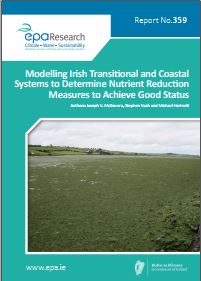
Authors: Joseph V. McGovern, Stephen Nash and Michael Hartnett, December 2020
Year: 2020
In this project three Irish estuaries were modelled with the aim of quantifying the impact on water quality of existing nutrient loading from direct and diffuse inputs. Recommendations on the necessary nutrient load reductions to improve estuarine water quality and the appropriate pressure to target in nutrient load reductions for the three systems studied are provided.
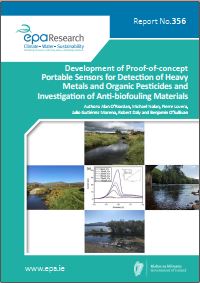
Authors: Alan O’Riordan, Michael Nolan, Pierre Lovera, Julio Gutiérrez Moreno, Robert Daly and Benjamin O’Sullivan, November 2020
Year: 2020
One important challenge in the 21st century is the ability to provide a clean and pollutant-free source of water. This project aimed to develop electrochemical and optical-based sensors for detection of organic contaminants (herbicides) and heavy metals. This research has shed light on the potential for the development and optimisation of novel environmental sensors and anti-biofouling strategies.
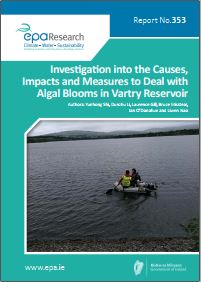
Authors: Yunhong Shi, Dunzhu Li, Laurence Gill, Bruce Misstear, Ian O’Donohue and Liwen Xiao, November 2020
Year: 2020
Vartry Reservoir is a very important drinking water source in Ireland. This project collected and analysed historical water quality and ecology data from 2016 to 2018 and a series of laboratory experiments were carried out to investigate the causes of diatom blooms to identify the pressures. The study also monitored nutrient levels in both the feeding rivers and the reservoir.
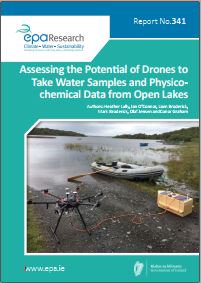
Authors: Heather Lally, Ian O’Connor, Liam Broderick, Mark Broderick, Olaf Jensen and Conor Graham, September 2020
Year: 2020
Water sampling remains a key component in the monitoring and assessment of aquatic environments. Sampling requiring the use of a boat can lead to issues around accessibility, particularly at remote lakes where there may be a lack of a slipway. This research has successfully demonstrated that water chemistry data collected using drone water sampling methods are not statistically different from those produced by boat sampling.
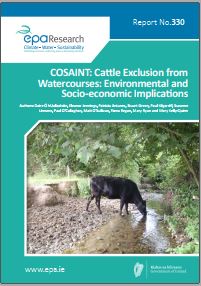
Authors: Daire Ó hUallacháin, Eleanor Jennings, Patricia Antunes, Stuart Green, Paul Kilgarriff, Suzanne Linnane, Paul O’Callaghan, Matt O’Sullivan, Fiona Regan, Mary Ryan and Mary Kelly-Quinn, July 2020
Year: 2020
Loss of pollutants from grassland systems to water bodies is a significant threat to water quality and represents one of the main environmental problems facing agri-ecosystems in Ireland. This project evaluated existing literature and generated temporal and spatial data on the environmental impact of cattle exclusion measures.
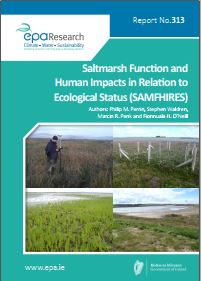
Authors: Philip M. Perrin, Stephen Waldren, Marcin R. Penk and Fionnuala H. O’Neill , April 2020
Year: 2020
Coastal saltmarshes provide a range of important ecosystem services but face increasing challenges because of human activities. Ecological assessments of saltmarshes are required to inform reporting in compliance with the European Union (EU) Habitats Directive (HD) (92/43/EEC) and Water Framework Directive (WFD) (2000/60/EC).
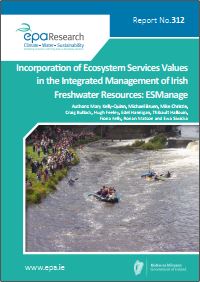
Authors: Mary Kelly-Quinn, Michael Bruen, Mike Christie, Craig Bullock, Hugh Feeley, Edel Hannigan, Thibault Hallouin, Fiona Kelly, Ronan Matson and Ewa Siwicka, April 2020
Year: 2020
The ESManage project tested an eight-step methodological framework to help embed ecosystem services and the ecosystem services approach into policy and decision-making for the sustainable management of water resources, as required by the Water Framework Directive (WFD).
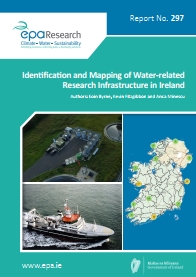
Authors: Eoin Byrne, Kevin Fitzgibbon and Anca Minescu, October 2019
Year: 2019
This project developed a new online national WRI database by collaborating with the water research community in Ireland, using an interactive consultation and design process. It is a central database of information on all WRI in Ireland, including the types of WRI available for various research areas and applications, from the freshwater sector to the marine, climate and agriculture sectors.
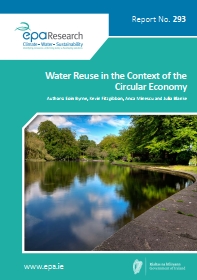
Authors: Eoin Byrne, Kevin Fitzgibbon, Anca Minescu and Julia Blanke, October 2019
Year: 2019
This project addresses water reuse in the context of the circular economy in Ireland. This study has reviewed the policy background for water reuse; assessed the international practices in water reuse; examined the main technologies that are used for water recovery and their suitability; and conducted significant stakeholder engagement, including the first national public survey on attitudes to water reuse in Ireland.
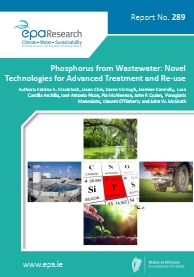
Authors: Katrina A. Macintosh, Jason Chin, Daren McHugh, Jasmine Connolly, Juan Castilla Archilla, José Antonio Pícon, Pia McAleenan, John P. Quinn, Panagiotis Manesiotis, Vincent O’Flaherty, and John W. McGrath., September 2019
Year: 2019
This project reviewed the current state of the art with respect to Phosphorus (P) removal and recycling, assessed the potential of novel removal and recovery systems, and facilitated an All Island Phosphorus Sustainability Workshop.
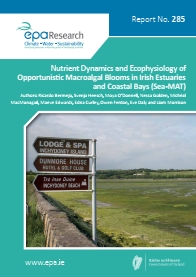
Authors: Ricardo Bermejo, Svenja Heesch, Moya O’Donnell, Nessa Golden, Michéal MacMonagail, Maeve Edwards, Edna Curley, Owen Fenton, Eve Daly and Liam Morrison, August 2019
Year: 2019
The Sea-MAT project aimed to understand the role of local environmental conditions in the development of green tides in Ireland.
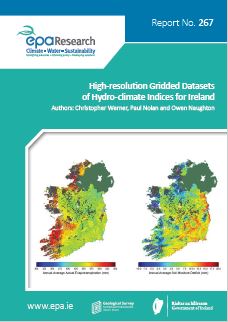
Authors: Christopher Werner, Paul Nolan and Owen Naughton, February 2019
Year: 2019
This report describes the application of numerical weather prediction (NWP) simulations to develop high-quality, long-term, gridded climate datasets of hydro-climate variables for Ireland, covering the period 1981–2016.
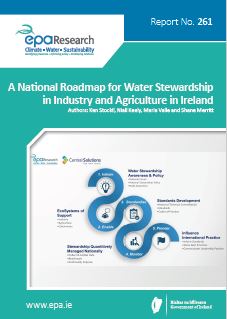
Authors: Ken Stockil, Niall Keely, Maria Valle and Shane Merritt, October 2018
Year: 2018
Following extensive desk research and a process of national and international consultation, this report captures key lessons for Ireland in relation to water stewardship and outlines an integrated roadmap towards establishing the country as a leader in the adoption of water stewardship best practice at both national and local levels in the years ahead.
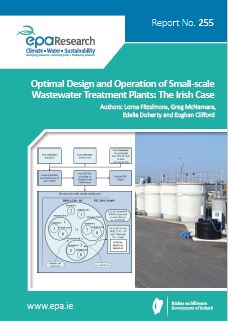
Authors: Lorna Fitzsimons, Greg McNamara, Edelle Doherty and Eoghan Clifford, August 2018
Year: 2018
There are many variables which must be considered when designing and operating a wastewater treatment system. The key objectives of this research were to develop software tools to assist in the selection and management of wastewater treatment systems, with a specific focus on small wastewater treatment plants in Ireland.
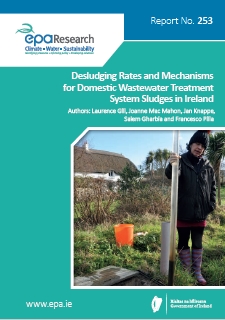
Authors: Laurence Gill, Joanne Mac Mahon, Jan Knappe, Salem Gharbia and Francesco Pilla, May 2018
Year: 2018
This study has produced a set of guidelines for owners of septic tanks and packaged treatment systems to help to address the lack of understanding among homeowners of how their domestic wastewater treatment systems operate and to encourage responsible operation and maintenance.
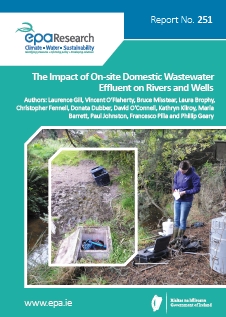
Authors: Laurence Gill, Vincent O’Flaherty, Bruce Misstear, Laura Brophy, Christopher Fennell, Donata Dubber, David O’Connell, Kathryn Kilroy, Maria Barrett, Paul Johnston, Francesco Pilla and Phillip Geary, May 2018
Year: 2018
This research project evaluated the impact of domestic wastewater treatment system (DWWTS) effluent as a health hazard to consumers of groundwater from private wells and also a source of nutrient water pollution to surface water in small catchments.
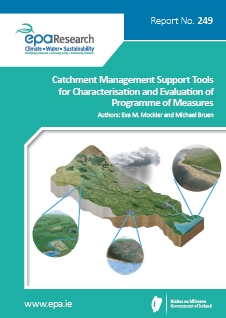
Authors: Eva M. Mockler and Michael Bruen, May 2018
Year: 2018
Nutrient enrichment and eutrophication can negatively impact on freshwater ecosystems, estuarine and coastal waters. As a result of improvements in nutrient management and regulation, there has been a large reduction in total phosphorus, total ammonia and total nitrogen emissions from Irish catchments in recent decades.
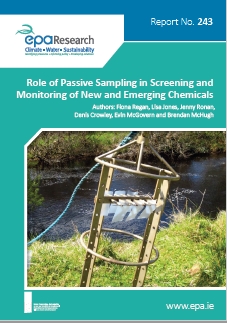
Authors: Fiona Regan, Lisa Jones, Jenny Ronan, Denis Crowley, Evin McGovern and Brendan McHugh, April 2018
Year: 2018
Passive sampling (PS) techniques are rapidly developing as very cost-effective state-of-the-art tools for identifying and measuring ultra-trace micropollutants in water.
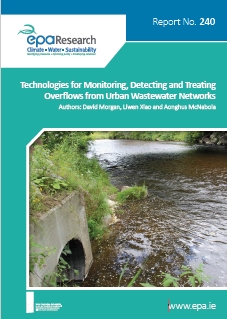
Authors: David Morgan, Liwen Xiao and Aonghus McNabola, March 2018
Year: 2018
In Ireland, most urban areas are drained by combined sewer systems, which convey wastewater and stormwater in a single pipe. During rainfall the capacity of combined sewers may be exceeded, leading to untreated discharges to receiving waters via storm water overflows (SWOs), which are a source of microbial pathogens.
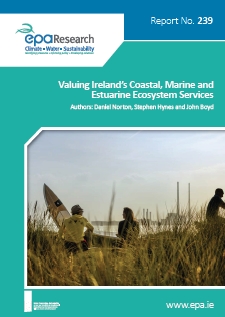
Authors: Daniel Norton, Stephen Hynes and John Boyd, January 2018
Year: 2018
This technical report demonstrates the data sources and methods that can be used to estimate the value of a number of coastal and marine ecosystem service benefits.